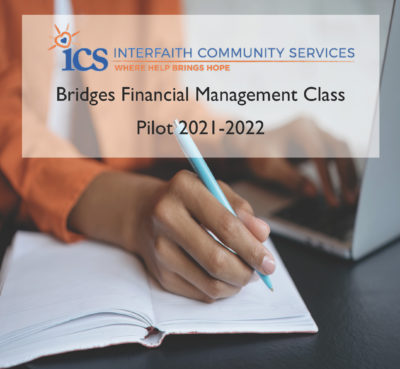 One of the final steps that Getting Ahead participants are encouraged to complete is a financial literacy course. The following information about a Bridges financial literacy pilot program course, which took place in 2021 and 2022 in Tucson, Arizona, is from a report authored by Madeleine deBlois and Kara Haberstock Tanoue, both of the University of Arizona Norton School of Family & Consumer Sciences.
One of the final steps that Getting Ahead participants are encouraged to complete is a financial literacy course. The following information about a Bridges financial literacy pilot program course, which took place in 2021 and 2022 in Tucson, Arizona, is from a report authored by Madeleine deBlois and Kara Haberstock Tanoue, both of the University of Arizona Norton School of Family & Consumer Sciences.
Since April 2021, 39 participants, known as Investors, have participated in the Bridges Financial Management Class (BFMC) program in Tucson, Arizona. The interactive 20-hour course was delivered by a trained facilitator in two-hour sessions over 10 weeks.
One goal of the BFMC program is to help Investors improve their knowledge of key financial management principles, including navigating banks and credit systems.
Across all indicators of managing credit, more Investors reported sound practices after the BFMC program than at baseline. By the end of the class, 100% of Investors reported that they knew how to get a credit report, understood how to read a credit report, and had gotten a credit report. The most dramatic increase was in the proportion of those understanding how to read a credit report, which was just 48% at baseline.
Investors also reported increases in knowledge in navigating the banking system. The proportion of Investors reporting an understanding of the fees and fines that banks charge more than doubled, going from 23% at baseline to 57% at post-test. Similarly, at the beginning of the course, only 43% of Investors reported knowing how to avoid fees and fines; this had risen to 73% by the end of the course. Despite these gains, mistrust of banks remains.
Only 37% of Investors report trusting banks, even after the BFMC program. At the end of the class, Investors overwhelmingly agreed that the BFMC program helped them increase knowledge and skills. The strongest agreement was voiced in support of the idea that BFMC helped Investors understand why their credit reports are important, closely followed by understanding the value of a savings or emergency fund and understanding how to repair one’s credit.
In addition to improvements in knowledge, Investors also reported positive changes in their money management behaviors. One of the greatest areas of growth was in the proportion of Investors using a budget. At baseline, only 39% of Investors reported using a budget; this more than doubled to 86% by the end of the program.
BFMC aims to support Investors not only in knowing about financial systems, but also in believing that they have the ability to competently and confidently manage their finances. Investors reported growth in feeling in control of their money and knowing where their money is spent every month. Furthermore, Investors’ beliefs that they can navigate a path forward and their sense of self-efficacy increased over the class.
All Investors offered positive views of their experience and would recommend it to others. Investors deeply appreciated that the facilitators were welcoming and relatable and that they shared their own personal stories in which the Investors could see themselves reflected.
About the program in Tucson
In 2021, Interfaith Community Services (ICS) in Tucson, Arizona, initiated a local pilot of the Bridges Financial Management Class (BFMC) program. As an organization, ICS has a long history of promoting self-sufficiency for economically vulnerable residents of Southern Arizona.
The Bridges Financial Management Class (BFMC) is a promising financial management program adapted from the FDIC’s Money Smart curriculum, revised “by and for people who experience ‘the end of the money coming before
the end of the month’” with the aim of delivering content in a way that recognized finite resources and strove to eliminate any sense that judgement was being passed on participants for not being in control of their finances (Bazata, et al., 2014).
BFMC’s creators adapted the program after recognizing that many financial education programs assume some basic stability of resources. The BFMC curriculum, created in 2009 in South Bend, Indiana, builds on key principles from Money Smart while adding in other elements to better address needs and issues faced by adults in poverty, e.g., those who are often operating in financial survival mode rather than long-term planning mode. Key among these approaches is an interactive classroom, featuring at least one guest speaker in each class, and one-on-one interactions with mentors. The program is also built through local relationships with financial sponsors, e.g., a local bank, who can continue to work with participants (known as “Investors” in the program) after the conclusion of the class. BFMC aims to educate participants on topics including credit, expenses and spending plans, banking, interest rates, and financial predators, while also working closely with participants to make sure they know how to navigate the system (e.g., pull a credit report) and take action.
References
Bazata, B., Hancock, S., & Werner, A. (2014). Bridges financial management class: Building confidence, competence, and commitment for financial stability. In From Vision to Action Volume II: Best practices to reduce the impact of poverty in communities, education, healthcare, and more. Highlands, TX: aha Process.
DeBlois, M., & Tanoue, K. H. (2022). Bridges Financial Management Class Final Evaluation Report. Tucson, AZ: University of Arizona Norton School of Family & Consumer Sciences.








